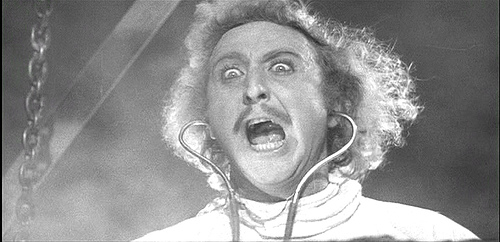GW
Gene Wilder has died. He was an unlikely movie star. A fine actor with a deft comic touch, but still not the kind of guy (or the kind of face) you'd think would be earmarked for stardom.
After starting out in the theatre and doing some work on TV, he got his first notable movie role in Bonnie And Clyde (1967), as an undertaker who has a rather nervous ride with the Barrow gang. It was clear from the start--here is an original, with his own offbeat comic style.
He was chosen the same year to play one of the leads in Mel Brooks' The Producers. The film is a comedy classic, thanks in no small part to Wilder's Leo Bloom, the meek accountant who's convinced to join a fraudulent scheme by Broadway producer Max Bialystock, played by Zero Mostel. While Mostel has the bigger part, in every sense of the word, I think Wilder's quiet yet panicky Bloom steals the show. The Oscars agreed, and gave him his only acting nomination.
After starring in another cult comedy, Start The Revolution Without Me, and showing some range in the more dramatic Quackser Fortune Has A Cousin In The Bronx, he starred in Willy Wonka & The Chocolate Factory. While not that highly thought of in its day, it's become a children's classic, held together by Wilder's funny yet sinister work--we don't know Wonka's motives until the end, and don't really know if he can be trusted along the way. It's possible generations hence this will be the part for which he's remembered.
After that he did a Woody Allen comedy, starring in one section of Everything You Always Wanted To Know About Sex But Were Afraid To Ask, where he portrays a man who falls in love with a sheep. While Mel Brooks and Woody Allen were the two top comic filmmakers of the 1970s, this is not one of Woody's better films, and Brooks would use Wilder to better advantage.
After a fairly listless version of Rhinoceros, costarring with his old pal Zero Mostel, Wilder returned to the Brooks' fold with the comic Western Blazing Saddles in 1974. The part wasn't written for him, but when veteran actor Gig Young wasn't up to the role of the experienced gunslinger, Mel Brooks frantically called the twenty-years-younger Wilder to replace him. Wilder seems so natural (and this was not the sort of part he usually played) that it's hard to believe it wasn't custom-tailored. The film was a blockbuster, and before the year was out, Brooks and Wilder made another huge hit, the horror parody Young Frankenstein.
This was actually Wilder's project, but Brooks, now a recognized comedy director, was brought aboard. This time around, Wilder is the clear lead and many would say it's his greatest role. While he's very funny, he also has to play it straight enough to hold the story together. (Also in 1974 he appeared in a small part in Stanley Donen's The Little Prince, as well as Thursday's Game, a little-seen TV-movie written by James L. Brooks that deserves another look.)
Now a major star, Wilder started writing and directing his own comedies. The next ten or so years would see The Adventure Of Sherlock Holmes' Smarter Brother, The World's Greatest Lover, The Woman In Red and Haunted Honeymoon. The films aren't bad (except for the last), but they definitely don't compare to his work with Brooks.
While this was happening, he found a new comic partner in Richard Pryor, and they made some hits of their own. First--and still best--is Silver Streak (directed by the recently-deceased Arthur Hiller). It's a romance and murder mystery aboard a train, but the real romance is between the duo of Wilder and Pryor. Their next three films together, Stir Crazy, See No Evil, Hear No Evil and Another You, are examples of diminishing returns.
In the midst of all this, Wilder made another gem that's mostly forgotten, The Frisco Kid. It's a comedy and a Western, but the story is played straight, unlike Blazing Saddles. Wilder is a rabbi on his way to a synagogue in San Francisco who meets up with tough hombre Harrison Ford. I wouldn't call it a classic, and it's a bit too long, but worth checking out.
Some of the films he made around this time featured Gilda Radner. Wilder and Radner became an item in the 1980s, and were married from 1984 until her death in 1989. Those last few years when she was ill he didn't do much work. However, when he returned to movies, he wasn't the star he'd been, and before too long, was out of films.
He went on to appear in a number of TV shows and TV movies, and essentially retired from acting in his late 60s. But there was a time, mostly in the 1970s, when he was the face of Hollywood comedy.






3 Comments:
https://pjmedia.com/spengler/2016/08/29/gene-wilders-best-joke/?singlepage=true
Why, on this day of mourning for a comic genius, with thousands of heartfelt tributes out there, did ColumbusGuy feel the need to direct us to a rant against Hannah Arendt?
Didn't get the joke, eh?
Post a Comment
<< Home